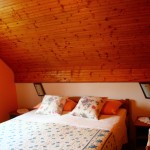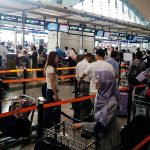Backpacking in Myanmar – The Ordinary Man

The Tiffin Carrier, and the umbrella which my Korean friend is holding for him
It was a rainy Thursday morning. We had just eaten our Myanmar breakfast consisting of some noodles that remind me of Mee rebus in Singapore, and some “naan with beans”.
Armed with a red umbrella and the others with their ponchos, we decided to follow Lonely Planets walking tour of Yangon.
So we walked. Past cobbled stones, concrete drain covers with cracks and holes, and gingerly hoped over puddles, although sometimes unsuccessful.
We passed many intersections, and since the roads were not clearly marked out, we decided to ask for help.
There was not many people around who could speak English, but when I spun around, I found just the right person to help me.
He was bespectacled, with his hair gelled up like that of Singapore secondary school boys. Tall, thin and dark, he carried a backpack, a small tiffin carrier, and a big umbrella. Unlike some men in the city who wore Longyis (a sarong like thing), he wore dark blue jeans that he folded up to mid-calf because of the rain. Sweat furrowed his brow, and I got see tiny rain droplets on his cotton good quality long sleeve shirt.
“Excuse me, do you know the way to Sule Paya?” I asked, flashing a nice smile.
“About four blocks away… Where are you from?” He asked
“We are from Singapore,” I said pointing to Friend S and myself. “And she is from Korea.” I said, pointing to my Korean friend.
“I see. Yes go straight all the way, and make a turn.” he said.
“Thanks! Will it take long?”
I sense a little struggle inside him, and then he said, “why don’t you follow me?”
And that is what we did.
During the walk from the old hospital to the Sule Paya (a grand pagoda in Yangon) , we learn that he is a university student studying law and mass communication. He speaks very good English.
He is on his way to school when we stopped him. He school starts at 930. It was already 9.15am.
“Its fine. I can “play truant”,” he laughs. “I will go to school at 1.30pm.”
But he requests we stop by his school on the way to the Paya. We agreed. After all, nothing can beat having a local tour guide.
“What is this building?” my friend asks, pointing to the old crumbling colonial building next to us.
“It is an old hospital,” he said.
We walked past a princely government like building with a Burmese Flag on the front.
“It is not wise to take photos here,” he tells us.
When we reach the Sule Paya, supposedly to be the starting point for our walking tour, he tells us he can bring us to Yangon’s grand Shwedagon Paya, the biggest and most golden pagoda with diamonds on the top that reflect light when the sun rises or sets.
“Please follow me, but stop by my school first.”
I had the opportunity to talk to him, and learn that unlike most of the people in this country, he is not a Buddhist. His father is Muslim, and mother is Christian.
“And what religion do you believe in?” he asks me.
I tell him.
“And do you believe in God?”
I said Yes, of course.
“Like 100 per cent?” he probes.
I said with utmost certainty, yes 100%, just rather surprised by his question.
Then I proceed to tell him my theory of God, which I shall not do so here.
I find it funny at how I find it easier to be open with this stranger I meet in a foreign land than maybe, with some friends at home.
“Then how about you?” I ask.
“I’m like you. Same same. There is a God, but I am in the middle,” he said.
“Then what are the religions there in Singapore?” he asked.
I told him, and the percentages, (I hope from my knowledge, they are accurate.)
And in Myanmar? I asked
70 per cent are Buddhist he said, and the remaining 30 per cent are Christian, Muslim and others.
He tells me once a Burmese Photographer took a picture of the Sule Paya, and the Mosque next to it.
“This shows how Buddhism and Islam can exist side by side.”
We walk past a tall building, and he tells me it is the tallest hotel in Yangon. Its name is the Traders Hotel and it is run by the Shangri-la group, and looks really grand. Like the one in Singapore.
“We Myanmar people, don’t know too much.” he tells me.
“Don’t know too much?” I repeated, quite surprised by the statement.
“Don’t know too much of the world,” he said. “We don’t know what is happening overseas.
I was quite surprised at his frankness. To be careful and to ensure if does not get into some sort of trouble, I have blanked out his face.
We reached his school and he asks us to wait for five minutes. I thought he was going to introduce us to his friends. He did, but he disappeared for five minutes, only to appear later and say,” Ok, I can show you the way to Shwedagon Paya.”
I realised later that he had requested permission from his teacher to pon teng. (play truant), to show us around.
He tells me he hopes to come to Singapore to study his Masters in Hotel Management. I smile and tell him that his English is fluent, and will not have problems adjusting. He has an English tutor, he tells me. He ask me how many English words do I know, like how wide is my vocabulary.
I tell him I can’t put a number to it. He smiles.
Close to the Shwedagon, he tells us he cannot bring us further as he has to return for lessons. He whips out a notebook and asks us to write our contact details.
After writing down his phone number, he said,”Please call me only after 830pm everyday. School ends at 630pm and I take two hours to get home.” (It is even worse than going to NTU). He takes a bus, and walks.
Before our final goodbyes, he whips out a checkered plastic file that some I see some Singaporean students have, and hands us a piece of paper with Burmese on it.
“What is this about?” I asked
“It is about laughter, About the benefits of laughing and smiling. I am a poet,” he said.
I tried to get the piece of translated, but I can’t.
Adobe Reader does not have Optical Character Recognition software that can recognise Burmese.
I have written to him to ask him for a translation in English, but he has not reply. I hope I have not got him into any sort of trouble.
He ends with a pen name – The Ordinary Man, the man on the street.
By talking to some of the Burmese people, I get a feeling that many of them want to go out of the country. Perhaps, there are better prospects elsewhere. Most of them cherish any time they have a chance to interact with foreigners, as they can give them a slightly balanced and fair view of what is outside.
Things should change. People are not puppets, but living, thinking organisms. They should have a right to decide on what is right for themselves.
For now, I am enjoying the freedom I have in Singapore. Something that can be easily taken for granted, because “you can’t see it, you cant feel it, it’s just there”. Sometimes, we only discover its existence when there is a threat that it can be taken from us.
I can go anywhere, use the internet freely, have media that provide balanced reports and do not print Social Studies lessons on their main newspaper.
I am free to travel to most places with my little red passport. I can take pictures of government buildings in Singapore I think? I don’t because they look as typical as any buildings around.
Freedom seems to be a basic human right, but sometimes, it just can’t be fulfilled.












